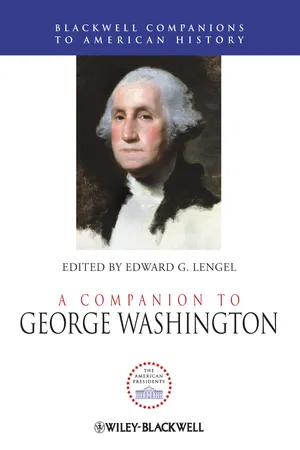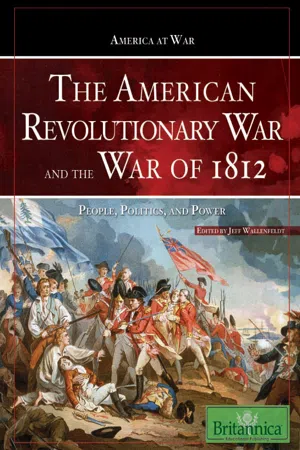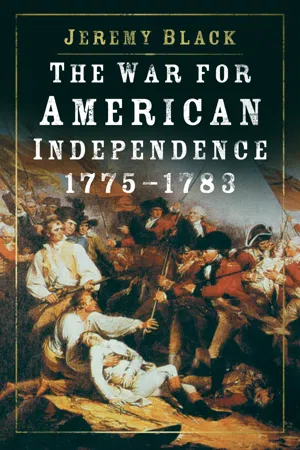Battles of Trenton and Princeton
The Battles of Trenton and Princeton were pivotal engagements during the American Revolutionary War. In December 1776, George Washington's forces crossed the Delaware River and launched a surprise attack on Hessian troops in Trenton, achieving a crucial victory. A week later, the Americans won another significant battle at Princeton, boosting morale and bolstering support for the revolution.
6 Key excerpts on "Battles of Trenton and Princeton"
- eBook - ePub
Ways of War
American Military History from the Colonial Era to the Twenty-First Century
- Matthew S. Muehlbauer, David J. Ulbrich(Authors)
- 2017(Publication Date)
- Routledge(Publisher)
...But rather than fall back, his army marched north to attack the Princeton garrison before Cornwallis could react. Though unexpected, British troops encountered advance elements of Washington’s army just outside Princeton, hence the surprise was not as complete as at the First Battle of Trenton. The Americans inflicted heavy casualties, though most of the garrison escaped. In both the engagements of January 2 and 3, the British suffered about 950 casualties, the Americans around 200. In these battles, the Americans had prevailed over the British tactically, as both attackers and defenders. Operationally, Washington had demonstrated the ability to move quickly and surprise his opponents, and to hold off an attacker and disengage on his terms. But Trenton and Princeton are remembered for their strategic consequences. Observers both then and now have credited Washington with nothing less than saving the American Revolution. These victories provided much-needed hope that the Americans could continue resisting the British. Patriot confidence and morale rose, as did hope that other countries might lend assistance to their cause. Washington kept his army in being, and acquired the reenlistments and new recruits needed for the campaigns of 1777. These battles also undermined the Howes’ strategic approach of sapping colonial support for the rebellion by grinding down the Continental Army in a series of relatively low-casualty defeats. Moreover, those inclined toward Loyalism in New Jersey stopped coming forward to take oaths to the King lest they become targets of Patriot supporters. Operationally, William Howe realized he could not risk keeping his army in many dispersed garrisons and had Cornwallis withdraw troops from southern New Jersey...
- eBook - ePub
- Edward G. Lengel, Edward G. Lengel(Authors)
- 2012(Publication Date)
- Wiley-Blackwell(Publisher)
...The advancing rebels surrounded Nassau Hall in the center of town, where they took several prisoners. With Cornwallis’s troops on the return march from Trenton, the Americans decided to give up the fight. In the Battle of Princeton, the British suffered roughly twenty killed, sixty injured, and 200 captured. The Americans lost about twenty-five killed and forty wounded, including Washington’s close friend, General Hugh Mercer of Virginia, who died a few days after the battle (PGW, Revolution, 7:521–30; Widmer (1975) 24–29). Washington contemplated next attacking New Brunswick, “but the harassed State of our own Troops (many of them having had no rest for two nights & a day) and the danger of losing the advantage we had gained by aiming at too much induced me by the advice of my Officers to relinquish the attempt.” After having gone double or nothing by re-crossing to New Jersey and making a stand at Trenton on January 2, and having gone triple or nothing in the attack on Princeton on January 3, Washington decided not to press his luck by going quadruple or nothing at New Brunswick. “In my Judgement Six or Eight hundred fresh Troops upon a forced march would have destroyed all their Stores and Magazines … and put an end to the War” Washington surmised, but “our poor soldiers” were too “bear foot & ill clad” to attempt it. Instead he moved north to Morristown and went into winter quarters (PGW, Revolution, 7:522–523). The Trenton-Princeton Campaign sheds tremendous light on Washington’s leadership skills. A republican general, Washington occupied a new role in the history of warfare. He did not (like General Howe) sit at the peak of a rigid, top-down, military hierarchy. Instead of leading by simply issuing orders, he led by example, persuasion, and listening. During the Trenton-Princeton campaign, Washington held no fewer than six councils of war with his officers (and occasionally civilians as well)...
- eBook - ePub
The American Revolutionary War and The War of 1812
People, Politics, and Power
- Britannica Educational Publishing, Jeff Wallenfeldt(Authors)
- 2009(Publication Date)
- Britannica Educational Publishing(Publisher)
...Sir William Howe forced the Americans to retreat through New Jersey and across the Delaware River into Pennsylvania. Howe then went into winter quarters, leaving the Hessian colonel Johann Rall at Trenton with about 1,400 men. Although Gen. George Washington’s Continental Army was discouraged by the year’s disasters, its morale was not crushed, and it now numbered 6,000 effectives. Ascertaining that the Hessians were virtually unsupported, Washington determined to attempt their capture. Despite the ice floes in the Delaware, Washington crossed the river on December 25 and surprised the enemy, the next day capturing more than 900 men. Four days later he occupied Trenton. Hearing of Washington’s move, Lord Cornwallis confronted the Continentals east of the city with about 7,000 troops on Jan. 2, 1777, driving them back. Unable to find boats for an escape, Washington called a council of war that confirmed his bold plan to break camp quietly that night and take a byroad to Princeton. The maneuver succeeded, and three British regiments that met him there on January 3 were all driven back or retreated. As a result, Washington continued his march to Morristown, N.J., where he flanked British communications with New York. Cornwallis retired to New Brunswick. Besides succeeding in breaking through Howe’s lines, Washington had placed himself in an advantageous position for recruiting his army and maintaining a strong defensive in the next campaign. George Washington standing with the flags captured from the British in the Battle of Trenton. Library of Congress Prints and Photographs Division The effect of these early American victories in the Battles of Trenton and Princeton, the first successes won by Washington in the open field, was marked...
- eBook - ePub
- Thomas Maitland Marshall(Author)
- 2011(Publication Date)
- Perlego(Publisher)
...At 8:15 the American forces drove in the Hessian outposts. Aroused from his bed Rail tried to make a stand, but the streets were raked with round shot and the sharpshooters fired relentlessly into the huddled Hessians, several hundred of whom fled across the Assumpink Creek bridge and escaped to Bordentown. Rail tried to rally his men but fell mortally wounded. When Sullivan cut off the retreat to the south and Greene ordered up his reserves, resistance ended. Nine hundred prisoners, a thousand muskets, six field pieces, and a large quantity of stores fell into the hands of the successful commander. But not in terms of men and guns should the battle of Trenton be judged. Its importance lies in the fact that Washington had won a clean cut victory when the Whig cause was tottering and by that victory had raised the drooping spirits of a despairing nation. Movements of the armies.—When the news of Trenton reached New York, it roused the British from their fancied security. Lord Cornwallis at the head of eight thousand men proceeded by forced marches toward the west. Washington had determined to hold a position east of the Delaware, and on December 30 he again crossed the river and by January 2, 1777, had assembled five thousand men and forty pieces of artillery just below Trenton. As Cornwallis approached the American position, he realized the costliness of a frontal attack, and decided that as soon as his forces assembled he would attempt a flanking movement from Allentown. Princeton, January 3, 1777.—Washington saw the danger and decided on a daring plan. On the night of January 2 all was activity in the American camp. Sentinels challenged, infantry moved about in the light of the camp fires, and the sound of pick and shovel was plainly audible to the British. But in the darkness to the rear another kind of activity was in progress...
- eBook - ePub
- Ian Barnes, Charles Royster, Charles Royster(Authors)
- 2014(Publication Date)
- Routledge(Publisher)
...After a brief struggle along King and Queen streets the Hessians are driven back. Colonel Rail falls mortally wounded, and the bulk of his command surrenders while some 500 men escape across the bridge toward Bordentown. Battle of Princeton Washington’s occupation of Trenton was made possible by the fright caused by his recent victory. General von Donop at Bordentown abandoned the Delaware line and withdrew his troops to Allentown, while the Americans posted pickets at Five Mile Creek bridge on the Post Road to Princeton. However, Cornwallis’ leave was cancelled and he was given 8,000 men to crush Washington and, maybe, the rebellion. Cornwallis’ plans placed 1,200 men at Princeton under Lieutenant-Colonel Harwood, while General Leslie was posted at Maidenhead (with 1,200 men). The British commander then advanced on Trenton with 5,500 troops, and, after brushing aside skirmishers at Shabbakonk Creek, entered Trenton on 1 January 1777. He faced American entrenchments near Assunpink Creek and, when Hessians tried to force its bridge, obstinate resistance drove the British force into a night encampment. Washington kindled fires and ordered 400 soldiers to keep them burning and to make camp noises. His forces then decamped in a night march to Sandtown with General Mercer commanding an advance guard of 200 men. Advancing along the Quaker Road to Princeton, Washington detached Mercer with 350 men to block the Post Road to Trenton and prevent British troops escaping after any attack on Princeton. Unknown to Washington and Mercer, Mawhood was marching to Trenton with 800 men to join Cornwallis. Mercer’s blocking brigade was observed while moving through the woods separating the Quaker and Post roads. A British assault followed and, after initial successful American resistance, a bayonet charge broke Mercer’s men who fled; the Americans were mainly armed with rifles and could not adequately defend themselves...
- eBook - ePub
- Jeremy Black(Author)
- 2021(Publication Date)
- The History Press(Publisher)
...Howe, believing the Americans to be thoroughly defeated, sent large detachments to clear the Delaware and convoy supplies, and encamped with less than 9,000 men in a poorly defended position at Germantown to the north of Philadelphia. Washington planned to attack in the early morning of 4 October after a night march by four converging columns, a scheme that was easier to formulate than to execute. It would have been difficult enough for well-trained troops; for Washington’s men this attempt to mount a larger version of the attack on Trenton could not be executed as planned. The two militia columns contributed little, and the two Continental columns failed to coordinate their advance, to the extent that, in the heavy fog of that morning, one, delayed as a result of having taken the wrong road, opened fire on the troops of the other. The Americans achieved surprise and pushed the British advance units back, but in the confusion of the morning were unable to exploit their advantage, while the British rallied quickly. A British counter-attack drove the Americans back with losses of 152 killed, 500 wounded and 438 captured to the British of just over 500. Nevertheless, Germantown revealed that the Americans could take the initiative without requiring the cover of the forests, while they were encouraged by the belief that they had come close to victory. Howe’s army had, indeed, come close to being beaten. A British participant recorded ‘this attack was the most spirited I believe they ever made on the British troops’. Washington reported on the 7th that he had been obliged to abandon the action when near victory and that ‘the tumult, disorder, and even despair, which it seems had taken place in the British army, were scarcely to be paralleled’. 45 The battle was arguably more important than Saratoga in gaining French military cooperation. It showed that Washington, who had suffered a substantial defeat at Brandywine, remained pugnacious and ready to attack...





